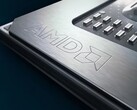With the latest financial report showing significant growth in most market sectors, AMD released an updated roadmap for its upcoming Zen 4 processor architecture, and it looks like the jump to TSMC’s 5 nm nodes could offer more power even for the thin and light mobile systems.
AMD thus confirms that the “Raphael” Zen 4 Ryzen 7000 desktop models will launch later this year, as the roadmap indicates a Q3-Q4 announcement window. These will be AMD’s first desktop models to support DDR5 RAM and PCIe 5.0, with a power envelope of at least 65 W. No details on the exact process node and iGPUs, unfortunately, but we already know that Zen 4 will require the new AM5 socket, so new motherboards are needed, as well.
Nothing surprising so far. However, things get quite interesting on the mobile side. AMD first mentions “Dragon Range” as part of its “Extreme Gaming Laptop” lineup scheduled for early 2023. These are the Ryzen 7000-HX models, most likely, as suggested by Dr. Ian Cutress in his latest tweets. Recommended chassis profile for such models is at least 20 mm as the power envelope is rated for 55 W and up. Rumor has it that these processors will integrate up to 16 cores and AMD is seemingly reinforcing this by specifying that the new chips will provide “highest core, thread and cache ever for a mobile gaming CPU.” Of course, DDR5 and PCIe 5.0 support is offered here, too, yet the iGPU info is still mising.
Perhaps more surprising is the “Phoenix” lineup with 35-45 W TDP targeting thin and light laptops. According to Ian Cutress, these should be the Ryzen 7000-H/S models, but, traditionally, AMD only reserved the Ryzen-U models for thin and light systems. Apparently, the jump to 5 nm allows for significant energy efficiency advancements, bringing more powerful chips to ultrabook designs. Primarily, Phoenix will offer LPDDR5 support, but Ian Cutress confirmed with AMD that DDR5 support should come later, so desktop versions for these chips could be on the cards.
It is unclear if the Ryzen-U series will be scrapped or eventually get relegated to palm-sized mini PCs.

























